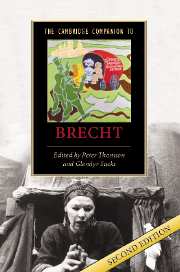Book contents
- Frontmatter
- Part I Context and Life
- Part II The Plays
- Part III Theories and Practices
- 12 Brecht and the Berliner Ensemble - the making of a model
- 13 Revolutionising theatre: Brecht’s reinvention of the dramaturg
- 14 Key words in Brecht’s theory and practice of theatre
- 15 Brecht’s poetry
- 16 Brecht and music: theory and practice
- 17 Brecht and stage design: the Bühnenbildner and the Bühnenbauer
- 18 Actors on Brecht
- 19 Brecht and film
- Bibliography
- Index
- Series List
19 - Brecht and film
from Part III - Theories and Practices
Published online by Cambridge University Press: 28 March 2007
- Frontmatter
- Part I Context and Life
- Part II The Plays
- Part III Theories and Practices
- 12 Brecht and the Berliner Ensemble - the making of a model
- 13 Revolutionising theatre: Brecht’s reinvention of the dramaturg
- 14 Key words in Brecht’s theory and practice of theatre
- 15 Brecht’s poetry
- 16 Brecht and music: theory and practice
- 17 Brecht and stage design: the Bühnenbildner and the Bühnenbauer
- 18 Actors on Brecht
- 19 Brecht and film
- Bibliography
- Index
- Series List
Summary
I am unaware of any influence, political or artistic, that I could have exercised on the film industry.
(Bertolt Brecht, 1947). “The question remains as to whether Brecht hasn't ultimately exerted a greater influence on cinema, via Godard, than on theatre.
(Hans-Joachim Ruckhäberle 1997)Despite countless proposals, screenplays and attempted collaborations, both prior to 1933 and in exile, Brecht had only two films to his name when he appeared before the House Un-American Activities Committee in 1947 and planned to make the statement quoted above. Moreover, the nature of Brecht's involvement in these two realised works has been widely contested. He is credited with co-authorship of the first, the short silent comedy The Mysteries of a Hairdresser's Shop (1923), directed by Erich Engel and starring the Bavarian comedian Karl Valentin. Little evidence survives to confirm the nature of Brecht's input. The second, the feature film Kuhle Wampe oder Wem gehört die Welt? of 1932, was a collaborative project, with Slatan Dudow directing and Brecht credited with co-authorship of the script. It was banned by the National Socialists less than ten months after its Berlin premiére.
However, as Hans-Joachim Ruckhäberle rightly suggests, Brecht's importance for film history is considerable and far exceeds the weight of his own film production and writing on the subject. Neither could be described as extensive, although - as ever with Brecht - they have been the focus of much analysis.
- Type
- Chapter
- Information
- The Cambridge Companion to Brecht , pp. 297 - 317Publisher: Cambridge University PressPrint publication year: 2006
- 2
- Cited by

